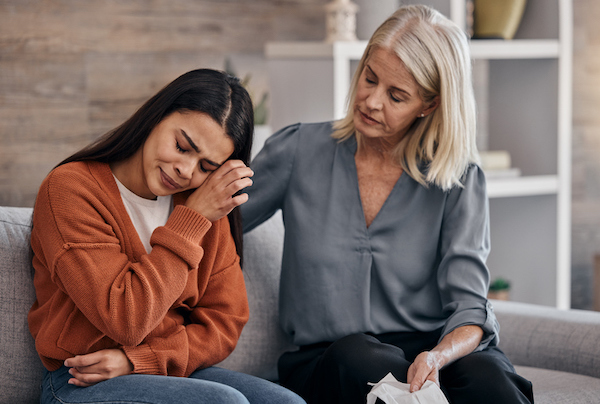Managing Your Own or Others' Depression
By Dr. Margaret PaulOctober 02, 2023
Are you or one of your family members depressed? Learn about the causes of depression and what you can do to help yourself and others.
 The medical profession is big on telling us that depression is caused primarily by a chemical imbalance in the brain. But Dr. Irving Kirsch, in “The Emperor’s New Drugs,” proves that this isn’t the case.
The medical profession is big on telling us that depression is caused primarily by a chemical imbalance in the brain. But Dr. Irving Kirsch, in “The Emperor’s New Drugs,” proves that this isn’t the case.
Depression has a number of non-chemical-imbalance causes. Research indicates that it can be caused by:
-
Unhealed childhood abuse and trauma,
-
An imbalance in the gut bacteria – caused by eating sugar and junk food - which can cause toxicity in the brain than can result in depression,
-
Toxicity from foods that contain oxalic acid or other toxins, and environmental toxins,
-
Emotional self-abandonment.
This article focuses on the latter.
What happens in our bodies is not separate from what happens in our minds. For example, if something bad were happening to you, such as getting mugged, your fight or flight reaction would kick in to help you fight or flee. The adrenaline and cortisol coursing through your body would be utilized for your survival. However, your body doesn't know the difference between when something bad is actually happening and when you think something bad is happening or will happen. When you think a scary thought, such as "something bad is going to happen to me," your body might go into the fight or flight reaction.
Adrenaline and cortisol, when they are present frequently, take a toll on the body, causing stress. Thinking about something bad happening, judging yourself, ignoring your feelings, numbing out your feelings with addictions and/or making others responsible for your feelings, can eventually result in fatigue, stress, or depression. The more you think thoughts that cause stress, the more chronic the stress becomes, often resulting in chronic depression.
You can take a drug that may mask depression, or you can start to become conscious of the thoughts from your wounded self that are causing the depression. If you choose to consistently practice Inner Bonding, you will gradually become more and more aware of the connection between your thoughts and your feelings, and you will slowly stop thinking and behaving in ways that cause anxiety and depression. You will develop a spiritually connected loving adult who will think and behave in ways that create inner peace and joy.
Managing a Family Member's Depression
If a family member is depressed, what can you do?
Being able to help a family member depends upon whether or not he or she is open to being helped by you. You cannot take responsibility for how others treat themselves, and you cannot MAKE others want to take responsibility for how they treat themselves. You are powerless over another's intention.
So, what can you do?
You can be a role model by taking loving care of yourself. If you consistently practice Inner Bonding and move into your peace and joy, your family member might start to wonder what you are doing that is making you so happy.
You can be compassionate with your family member, letting them know that you care about them, and that you are available to help them if they want help.
If your family member wants your help, you can refer him or her to the free Inner Bonding course, to Inner Bonding books, courses, workshops, Intensives, IBVillage, and Inner Bonding Masterclass, and to an Inner Bonding facilitator.
You can role model healthy eating, which might have a big influence on your family member.
What is not helpful to your family member is for you to join them in their depression, which you might do if you take responsibility for their feelings. You need to make sure that you are NOT blaming yourself, judging yourself, or in any way allowing yourself to believe that you are the cause of another's depression. Depression is caused primarily by how we treat ourselves - physically, emotionally, and spiritually.
If your family member is too depressed to practice Inner Bonding, then he or she might need medication, which can create a window of opportunity to learn to take loving care of themselves. While meds do not solve the problem, they may reduce the depression to the point of being able to learn self-care.
If your family member has no intention of learning to take care of themselves, then you need to accept this and take care of yourself in the face of their choice to continue to abandon themselves. It can be heartbreaking to witness this in someone you love, but taking loving care of yourself will get you through the heartbreak.
Join Dr. Margaret Paul for her 30-Day at-home Course: "Love Yourself: An Inner Bonding Experience to Heal Anxiety, Depression, Shame, Addictions and Relationships."
 Send this article to a friend
Send this article to a friend  Print this article
Print this article  Bookmarked 0 time(s)
Bookmarked 0 time(s)
| Related Articles |
|---|
| What About Drugs for Anxiety and Depression? |
| Loving Yourself Heals Depression |
| Diet, Anxiety and Depression |
Comments
| Author | Comment | Date |
|---|---|---|
| Join the Inner Bonding Community to add your comment to articles and see the comments of others... | ||

Daily Inspiration
Send blessings of love to those around you who are grumpy, angry, blaming or withdrawn. Reassure your inner child that others' behavior is not about you. Remember: you can help others with your love but you cannot control their intent.
By Dr. Margaret Paul

 Share with Del.icio.us
Share with Del.icio.us Share with Digg
Share with Digg






